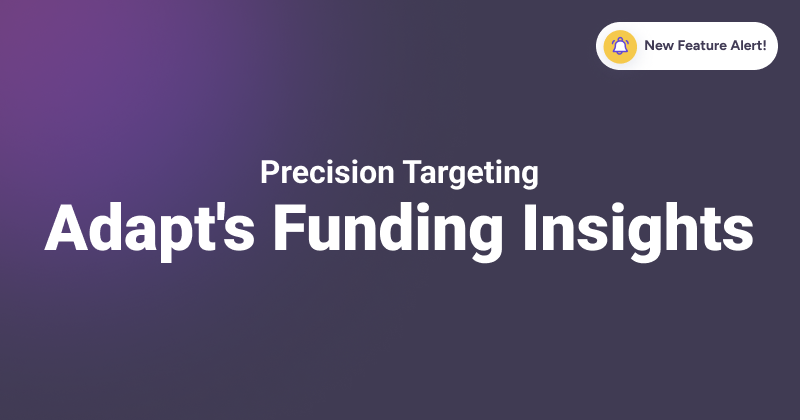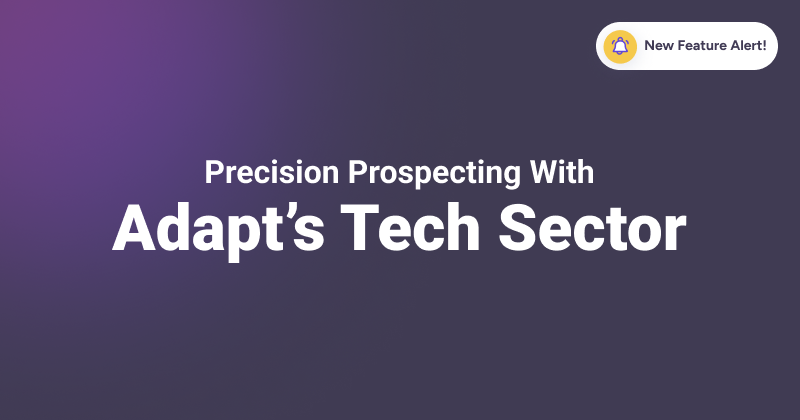Have you ever tried to pitch your product or service to someone you’ve never met before?
How did that turn out?
It’s clear that having insights into potential customers significantly boosts your likelihood of sealing a deal. If that’s your goal, then lead intelligence is the key you’ve been searching for.
Lead intelligence offers a more nuanced approach to prospecting, recognizing the unique nature of each lead. A survey by Databox revealed that nearly 70% of marketers and sales professionals consider lead intelligence highly effective in identifying and attracting new customers.
Opinions vary widely on what makes a lead ready for sales, with factors such as industry and sales methodology influencing the specific information required to deem a B2B lead as pursuit-worthy. This is where lead intelligence plays a crucial role, providing sales professionals with insights into prospects’ needs and challenges—vital for securing B2B sales victories. Sales and marketing teams employ lead intelligence software to verify lead information and successfully convert prospects.
Lead intelligence is the preferred method for enriching B2B lead generation efforts in a competitive market. This blog will provide you with an introduction to lead intelligence, explaining its capabilities, significance in sales, advantages, various data types, and the top tools for lead intelligence.
What is Lead Intelligence?
Lead intelligence comprises all the data and personal details that marketers and sales professionals gather about high-quality leads and prospects. This information helps companies assess how well a lead matches their ideal customer profile.
Lead intelligence improves your insight into prospective clients, enabling you to more accurately identify their challenges, engage in meaningful communication, and ultimately secure their business. This is especially crucial for B2B sales, where lead intelligence is indispensable.
Considering the effectiveness of lead intelligence in prospecting, it’s likely that your competitors will adopt this strategy if they haven’t already. This underscores the importance of quickly integrating this valuable data into your sales strategy.
Why is Lead Intelligence Important for Sales?
Lead intelligence is pivotal for sales because it transforms the art of selling into a science. It leverages data to pinpoint potential customers’ needs, preferences, and behaviors. This data-driven approach enables sales teams to craft personalized outreach strategies, significantly enhancing the chances of converting leads into customers.
In today’s data-driven sales landscape, lead intelligence isn’t a perk; it’s a necessity.
Here’s why:
Target the Right Leads:
Imagine ditching the spray-and-pray approach. B2B sales intelligence tools analyze data to identify high-potential leads with a greater chance of converting.
Personalize Your Pitch:
No more generic emails! Uncover additional profile insights like a prospect’s company needs and online behavior, allowing you to tailor your message for maximum impact.
Boost Productivity:
Automate tedious tasks like lead scoring and data management. This frees your sales team to focus on closing deals rather than filling out spreadsheets.
Make Data-Driven Decisions:
Ditch intuition in favor of additional data insights. Lead intelligence provides historical sales data and future forecasts, empowering you to plan your sales pipeline strategically
The result? More qualified leads, personalized engagement, a more efficient sales team, and ultimately, more deals closed.
Quickly adapting and responding to leads’ needs and behaviors is crucial in competitive markets. Lead intelligence not only arms sales teams with the necessary information to make informed decisions but also offers a competitive edge by enabling a proactive rather than reactive approach to sales.
Lead intelligence is the cornerstone of a modern, effective sales strategy. It drives efficiency, personalization, and, ultimately, higher conversion rates.
Benefits Of Employing Lead Intelligence in Your SaaS
Imagine attracting high-value leads who are practically looking for your solution. Lead intelligence unlocks this reality for SaaS businesses by transforming your sales game.
Employing lead intelligence in your Software as a Service (SaaS) business can yield significant benefits, streamlining your sales process and driving growth. Here are some key advantages of leveraging lead intelligence:
Targeted Lead Acquisition:
B2B Lead intelligence tools help you identify and acquire leads that align with your ideal customer profile. By analyzing data such as company size, industry, and technology stack, you can focus your marketing efforts on the prospects most likely to convert, maximizing your return on investment.
Personalized Outreach:
With detailed buyer intent insights into your leads’ pain points, challenges, and interests, you can tailor your messaging and product demonstrations to resonate with each prospect. Personalized outreach improves engagement, builds trust, and increases the likelihood of closing deals.
Accelerated Sales Cycles:
Lead intelligence equips your sales team with valuable context about each lead, enabling them to have more meaningful conversations and address specific concerns promptly. This streamlined approach can significantly shorten sales cycles and accelerate revenue generation.
Improved Lead Scoring and Prioritization:
By leveraging lead intelligence data, such as engagement levels, buying signals, and fit criteria, you can accurately score and prioritize leads. This ensures that your sales team focuses on the most promising opportunities, optimizing their productivity and increasing conversion rates.
Streamlined Customer Retention:
Lead intelligence doesn’t stop at acquisition; it also provides valuable insights into existing customers’ needs, pain points, and usage patterns. This intelligence can inform your product roadmap, customer success strategies, and targeted upsell/cross-sell opportunities, fostering long-term customer relationships and reducing churn.
By integrating lead intelligence into your SaaS business operations, you can gain a competitive edge, improve sales and marketing efficiency, and drive sustainable growth by attracting, converting, and retaining high-value customers.
Different Types of Lead Intelligence Data
Grasping the various types of lead intelligence data and knowing their appropriate applications is equally important as selecting the right software. B2B Lead intelligence platforms extend beyond merely confirming the accuracy of email addresses for cold outreach. These robust software solutions gather insights into when and where prospects engage with your brand.
Many lead intelligence platforms leverage predictive analytics to evaluate these interactions, providing sales representatives with real-time updates on lead behavior. By understanding the actions leads take throughout your sales funnel, you can better identify qualified leads and pinpoint accounts that require additional nurturing. This holistic approach streamlines the lead management process, enabling you to focus on the most promising opportunities and accelerate conversions.
Lead intelligence data plays a pivotal role in shaping sales strategies and enhancing the performance of sales teams across various industries. By harnessing a diverse range of lead intelligence data, sales professionals can gain a significant edge in targeting, engaging, and converting leads more effectively. Below, we explore different types of lead intelligence data and discuss how each can benefit your sales team.
Different types of lead intelligence data and their advantages for your sales team include:
Company Information –
This data encompasses any developments within your prospect’s company performance (such as securing funding or making acquisitions) that could affect their buying decisions. Leveraging this information allows you to tailor your product as an essential solution to the challenges they may face during growth phases.
Demographic Insights –
These specifics are pivotal for personalizing your sales approach, a key factor in standing out during outreach efforts. Utilizing demographic data enables you to customize your pitch, highlighting how your product addresses the unique needs tied to the lead’s role and responsibilities.
Social Media Profiles –
These are instrumental for engaging in social selling, particularly on platforms like LinkedIn, which is revolutionizing how sales are conducted. A relaxed online sales approach underscores the importance of connecting with leads on their favored social platforms.
Website Activity –
Tracking both new and returning visitors to your website provides insights into who is seeking information or considering purchases. Monitoring return visits is crucial. Lead intelligence offers a deeper understanding of which prospects frequently visit your site, the pages they are most interested in, and their previous interactions with lead capture forms.
Contact Information –
Contact information is the foundation of any sales effort. It includes basic details such as names, phone numbers, email addresses, and sometimes job titles or departments. Having accurate contact information is crucial for reaching out to potential leads without wasting time on outdated or incorrect data. It enables personalized communication and ensures that your sales messages reach the intended recipients, thereby increasing the chances of engagement and conversion.
Pages Visited –
Tracking which pages a lead has visited on your website offers valuable insights into their interests and needs. This data can help sales teams understand what solutions or information the prospect is seeking, allowing for more tailored and relevant sales pitches. By analyzing the pages visited, sales professionals can infer the lead’s pain points or areas of interest, making it easier to engage in meaningful conversations and present the most appropriate solutions.
Emails Opened –
Monitoring which emails a lead has opened and interacted with provides a clear indication of their engagement level and interests. This data allows sales teams to refine their email marketing strategies, focusing on content that resonates with their audience. It also helps in identifying the most promising and hottest leads, those who are actively engaging with your content, enabling sales teams to prioritize their outreach efforts accordingly.
Personality Characteristics –
Understanding a lead’s personality characteristics can significantly enhance the personalization of sales approaches. This type of data can be gleaned from social media profiles, interaction patterns, and even the tone and content of emails exchanged. Sales professionals can use this information to adapt their communication style, approach, and even the timing of their outreach to match the lead’s preferences, increasing the likelihood of a positive response.
Lead Score –
Lead scoring involves assigning a numerical value to each lead based on their perceived value to the organization. This scoring is typically based on a combination of factors, including engagement with marketing content, demographic information, and specific behaviors exhibited by the lead. A higher and actionable lead score indicates a lead that is more likely to convert, enabling sales teams to focus their efforts on the most promising prospects. This prioritization helps in optimizing the allocation of resources and maximizing the efficiency of the sales process.
Challenges with Lead Scoring –
While lead scoring is a powerful marketing tool for prioritizing efforts, it also presents challenges. These include determining the right criteria and weights for scoring, keeping the scoring model updated with changing market dynamics, and ensuring the agile integration of lead scoring insights into the sales process effectively. Overcoming these challenges requires ongoing analysis, adjustment, and communication between marketing and sales teams to ensure that lead scoring remains a valuable asset in identifying and converting high-potential and segmented leads.
The advantages of leveraging these diverse types of lead intelligence data are manifold:
Increased Efficiency:
By focusing on actionable leads that are most likely to convert, sales teams can reduce time spent on less promising prospects.
Enhanced Personalization:
Detailed insights into leads’ interests, behavior, and characteristics allow for highly personalized outreach strategies, significantly improving engagement rates.
Better Decision Making:
Access to comprehensive lead intelligence supports more informed decision-making, enabling sales reps to tailor their approaches based on solid data.
Improved Conversion Rates:
With targeted and relevant sales efforts, conversion rates are likely to improve, directly impacting the bottom line.
In conclusion, the strategic use of lead intelligence data can transform the sales and marketing processes, making it more targeted, efficient, and effective. By understanding and utilizing various types of lead intelligence data, sales reps can significantly enhance their ability to connect with prospects in meaningful ways, thereby increasing their success in converting leads into customers. Overcoming the challenges associated with lead scoring and continuously refining the use of lead intelligence will ensure that sales efforts are as productive and impactful as possible.
Best Lead Intelligence Tool – Adapt.io
Adapt.io stands out as an all-encompassing lead intelligence platform equipped with potent lead generation capabilities. Utilizing Adapt.io allows for the qualification of leads through critical data attributes. With a comprehensive database containing over 200 million verified contacts, crafting a targeted prospects list and converting leads into customers becomes seamless. The platform seamlessly integrates with CRM systems, enhancing data accuracy and boosting the influx of qualified leads into your sales funnel.
This platform delivers a range of features, including lead enrichment with more than 20 data parameters to improve your existing tech stack and lead database, along with APIs to streamline the process of customer data enrichment. Adapt.io empowers you to efficiently connect with your ideal prospects, thereby refining your sales strategies.
Here’s a quick look at Adapt’s key Features:
Data Accuracy:
Offers precise and validated contact details of B2B companies that is crucial for executing effective email marketing campaigns.
Extensive Database:
A singular management platform boasting a database of over 200 million B2B contacts across diverse industries and regions, enabling the creation of a tailored email list.
Advanced Search and Filtering:
Features comprehensive search and filtering tools that simplify the process of identifying your target audience based on specific factors like industry, size, department, role, and technology.
Integrations:
Ensures smooth integration with existing tech stack and sales tools, facilitating effortless outreach to potential B2B clients.
Customer Support:
As a leading provider of B2B email lists, Adapt.io offers unparalleled customer support and assistance around the clock.
FAQs
By acquiring more information about individuals who show interest in your product and brand, you gain a deeper insight into your market, enabling you to refine your targeting strategies. Understanding the origin, context, and contact methods of your leads allows you to concentrate your efforts on generating higher-quality leads. Lead intelligence guides strategic decisions, including choosing advertising operations platforms and shaping content and campaign optimization strategies.
Account-based marketing involves creating tailor-made experiences for specific prospects rather than using a one-size-fits-all approach with generic messages. This strategy, especially useful for engaging large, valuable clients, demands considerable time and resources.
Lead intelligence software equips your team with crucial data to craft personalized outreach efforts and sales dialogues. It saves time by aggregating, enriching, and presenting data on potential clients through user-friendly dashboards and reports, eliminating the need for manual data gathering.
Automated tools with features such as Customer Relationship Management (CRM) integration allow you to export data in bulk and run large scale outbound campaigns.
By using tools such as Adapt, you gain access to advanced search filters spanning various locations, industries, and departments, that identify accurate and viable decision maker data.
Having a shared AI tool can also strengthen coordination between marketing and sales and make your content marketing more relevant!
Implementing a SaaS-based sales enablement tool can automate sales, marketing, and customer support workflows. The software’s functionalities, such as automated lead scoring, marketing automation features, segmentation, and list creation, minimize manual tasks and enable teams to allocate their efforts towards more significant activities. This shift from focusing on lead quantity to prioritizing lead quality enhances customer experiences, bolstering not only customer acquisition but also retention.



